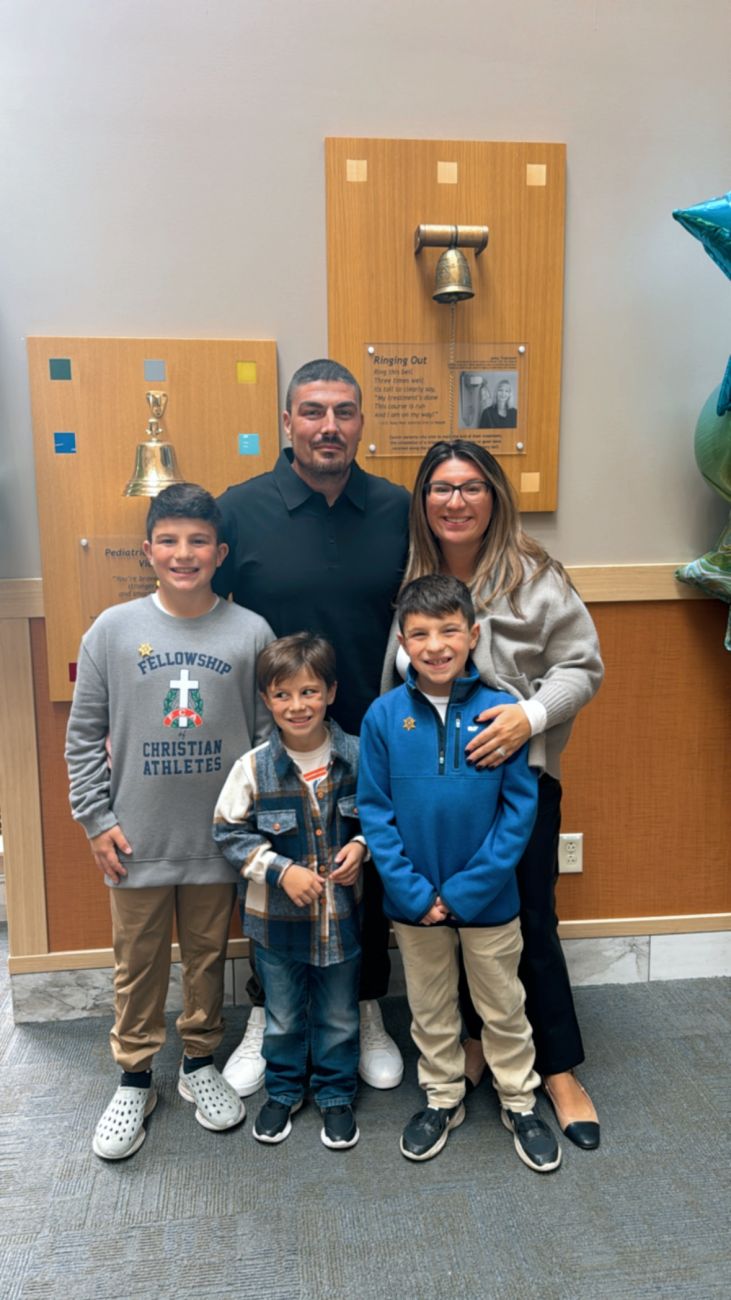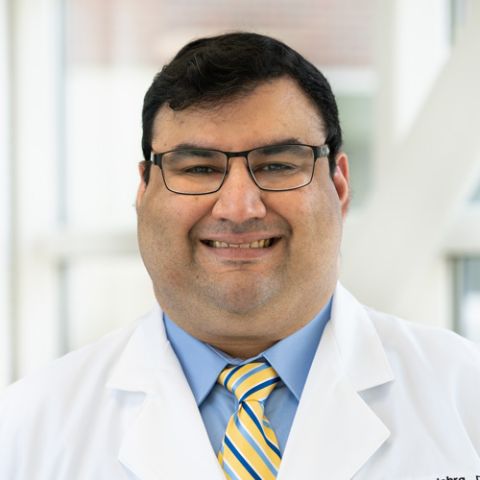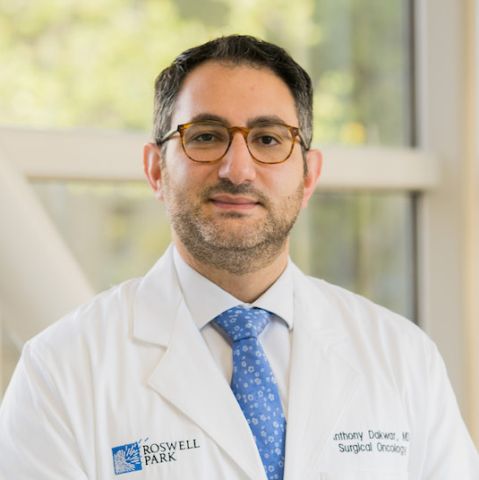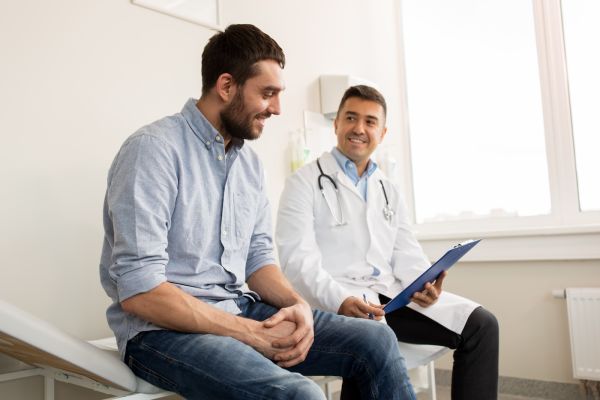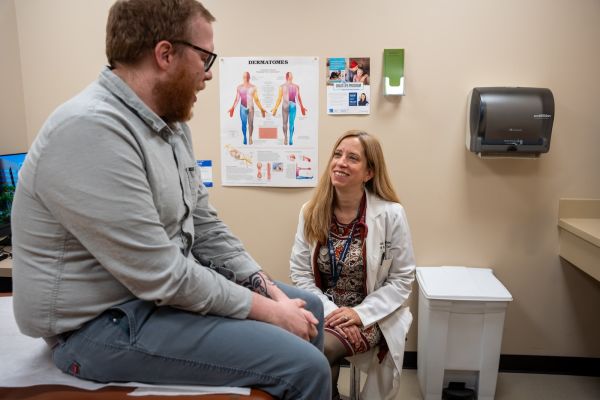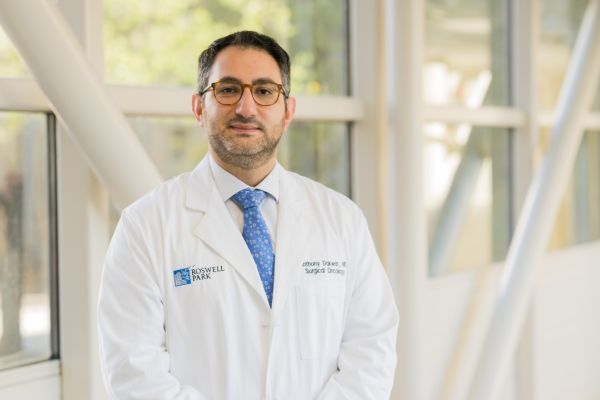A clinical trial at Roswell Park offered a way to avoid extensive surgery for stage 3 cancer
Brandon Radoani always considered himself healthy. He kept himself physically fit. He visited his primary physician religiously for yearly physicals. At age 35, Brandon never had any major surgery or illnesses. So it came as a complete shock in January 2024 when sudden symptoms prompted an emergency colonoscopy.
“When I came to, I could hear my wife, Meagan, crying,” he says. “The doctor told me I likely had colorectal cancer.” Once the couple overcame their initial disbelief, they immediately called Roswell Park Comprehensive Cancer Center as recommended by Brandon’s primary physician.
Within a week, Brandon and Meagan met with the gastroenterology team, including Deepak Vadehra, DO, Director, Early Onset Cancer Program, who specializes in treating young adult patients with colorectal cancer, and Anthony Dakwar, MD, FACS, FASCRS, Surgical Oncologist and Medical Director of Perioperative Services.
Clinical trial offered a new approach
“Roswell Park did their own colonoscopy, and recommended different treatment options,” says Brandon. One of those options was surgery, but that would have a lasting impact as it would result in a colostomy bag to collect waste. Another option would be radiation and chemotherapy, using a protocol that was in clinical trials. “Fortunately, I was a perfect candidate for the chemotherapy clinical trial. I chose that option.”
Clinical trials offer patients the opportunity to access the very latest promising treatment options. As many as 50% of Roswell Park patients are eligible for a clinical trial and participation is entirely up to the patient. When clinical trials find that a new treatment is more effective or less toxic than current approaches, the new treatment can eventually become the standard of care.
Brandon is an Erie County sheriff’s deputy. He served as a specialist in the U.S. Army, responding to natural disasters including hurricanes. But nothing, he says, compares to battling cancer. His treatment entailed six weeks of radiation and four months of chemotherapy. “There were times I wanted to quit,” says Brandon. “I would get my chemo on Monday and just come home and crawl into bed until Saturday.”
But he knew giving up was not an option. “I didn’t want my kids to grow up without a father,” he says. “We agreed to fight this as a family.” He says the support of the Roswell Park staff encouraged him to keep going. “The overall atmosphere is so positive when you go there,” says Brandon. “It starts right when you pull up to the valet, who says, ‘you are going to do great today!,’ and continues with the volunteers to the nursing staff.”
Brandon’s wife and three young sons, now 12, eight and five, were by his side when he rang the Victory Bell after being declared cancer free in October 2024.
Colorectal cancer is rising among younger people
While most people diagnosed with colorectal cancer are age 50 and older, the number of colorectal cancers among younger people is increasing alarmingly. In fact, national guidelines have lowered the age at which to begin colorectal screening to age 45 — and even younger if you have a colorectal cancer diagnosis in your family, or you have other risk factors such as colorectal polyps or inflammatory bowel disease.
For people like Brandon, who are younger than age 45 and not at higher risk, paying attention to your body and telling your doctor about any new symptoms is critical. People in the early stages of colorectal cancer may not have any symptoms, which makes early screening more crucial.
However, if you experience any of the following symptoms, and they don’t resolve within a few weeks, contact your doctor for evaluation:
- A change in bowel habits, such as diarrhea or constipation
- A change in the caliber of your stool (becoming pencil thin)
- Blood in your stool, or rectal bleeding
- Dark or black stool
- Abdominal discomforts, such as pain or cramping
- Sensation that you need to have a bowel movement, even after you have had one
- Unexplained weight loss
- Weakness or feelings of tiredness (due to low red blood cell count or anemia)
Treating young onset colorectal cancer
Your treatment plan will be personalized specifically for you and your cancer, integrating critical support services into your comprehensive care.
Brandon’s cancer journey has given the family a different perspective on life. The Radoanis focus a lot on family time, and don’t rush, but soak up each moment. Brandon and Meagan know that ringing the Victory Bell is not the end of the journey. Brandon regularly has scans and meets with his doctors to discuss what to expect.
“Both Dr. Vadhera and Dr. Dakwar were integral to my recovery and my mental health,” says Brandon. “They're both transparent but kind. We knew exactly what to expect, and what our life was going to look like.” Most importantly, they never lost sight of hope for Brandon's future. While the journey may be long and the road bumpy at times, there is indeed light at the end of the tunnel.
Editor’s Note: Cancer patient outcomes and experiences may vary, even for those with the same type of cancer. An individual patient’s story should not be used as a prediction of how another patient will respond to treatment. Roswell Park is transparent about the survival rates of our patients as compared to national standards, and provides this information, when available, within the cancer type sections of this website.

